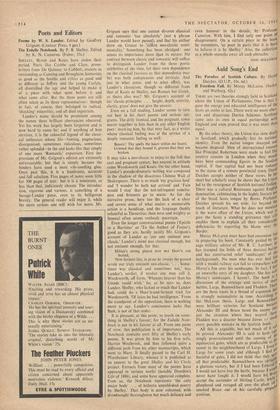Poets and Editors
Poems by W. S. Landor. Edited by Geoffrey Grigson. (Centaur Press, 4 gns.) The Esdaile Notebook. By P. B. Shelley. Edited by K. N. Cameron. (Faber, 35s.) SHELLEY, Byron and Keats have stolen their period. Poets like Crabbe and Clare, prose- writers from De Quincey to Cobbett, orators as outstanding as Canning and Brougham, humorists as good as the Smiths and critics as good and as different as Jeffrey and the young Carlyle, all diversified the age and helped to make it of a piece with what went before it and what came after. But the three poets are still often taken as its three representatives: though in fact, of course, they belonged to radical, 'shocking' minorities, and all died expatriate.
Landor's name should be prominent among the names these brilliant aberrancies obscured. Yet his work has largely been forgotten and is now hard to come by; and if anything of him survives, it is the colourful legend of the classi- cal enthusiast whose life—fuming, pugnacious, disorganised, sometimes ridiculous, sometimes rather splendid—in the end looks like that simply of one more 'Romantic' expatriate. First im- pressions of Mr. Grigson's edition are extremely unfavourable; but that is simply because the binders have used a most vile-smelling glue. Once past this, it is a handsome, accurate and full selection. Five pages of notes seem little for 300 pages of text : but it is a minimum, or less than that, judiciously chosen. The introduc- tion, vigorous and various, is something of a Savage-Landor piece, even to its belligerent brevity. The general reader will enjoy it, while the more serious one will wish for more. Mr. Grigson says that one cannot divorce classical and romantic 'too absolutely' (not a phrase Landor would have passed), and that his author drew on Greece to 'stiffen neo-classic senti- mentality.' Something has been abridged: one senses its importance more than its nature. No contrast between classic and romantic will suffice to distinguish Landor from the three poetic celebrities of the time, for their own dependence on the classical (various as that dependence may be) was both conspicuous and intricate. And just in what sense, and to .hat effect, was Landor's classicism, though so different from that of Keats or Shelley, not Roman but Greek, as theirs also was? Mr. Grigson's account of his 'classic principles . . . height, depth, severity, clarity, grace' does not give the answer.
Even on a full reading, Landor seems to turn out best in his short poems and serious epi- grams. The drily ironical, and the poignant, come nearer together in him than in any other English poet : marking him, by that very fact, as i; writer whose classical feeling was at the service of a deeply romantic feeling as well :
Beauty! Thy spells the heart within me heard, Grieved that they bound it, grieves that they are broken.
It may take a neo-classic to enjoy to the full that curt and pregnant syntax; but nearest in attitude come Wordsworth and Keats. On the other hand, Landor's pseudo-dramatic writing was composed in the shadow of the disastrous Chinese Wall of Shakespeare. There is so much 'my gracious lord' and 'I wonder he hath nqt arrived' and 'Fain would I stop' that the not-infrequent concise- ness and firmness go to waste. As for the narrative prose, here too the lack of a clear and severe sense of what makes a memorable action is a handicap, and the language (lushly colourful as Theocritus, then terse and weighty as Seneca) often seems restlessly uncertain.
Even the longer conversational poems ('Epistle to a Barrister' or To the Author of Festus), good as they are, hardly justify Mr. Grigson's account of Landor as 'our one eminent neo- classic.' Landor's mind was classical enough, but not eminent enough, for that.
Milton's strong pinion now not Heav'n can bound,
Now Serpent-like, in prose he sweeps the ground wrote our truly eminent neo-classic. . . Some- times was classical and sometimes not,' was Landor's verdict, if verdict one may call it. Wordsworth, off form, 'Wheezes heavier than his friends could wish.' So, as he says so, does Landor. Shelley, who lacked so much that Landor had, could do a Heav'n-and-Serpent trick for Wordsworth. 'Of lakes he had intelligence.' From the standpoint of the opposition, there is nothing more to say. Landor's conciseness lacks that flash, is not of that order.
It is pleasant, at this point, to touch on some- thing in Shelley's favour; for the Esdaile Note- book is not in his favour at all. From one point of view, this publication is of importance. The Notebook contains over fifty of Shelley's early poems. It was given by him to his first wife, Harriet Westbrook, and thus followed quite a different path from his other manuscripts, which went to Mary. It finally passed to the Carl H. Pforzheimer Library, whence it is published as an annexe to the great Shelley and his Circle project. Extracts from most of the poems have appeared in various works (notably Dowden's Life of 1886), and some have appeared complete. Even so, the Notebook represents 'the only major body . . . of hitherto unpublished poetry by Shelley.' That body is now exhumed, with dreadnought thoroughness but much delicacy and
even humour in the details, by Professor Cameron. With him, I find only one point of disagreement. On a certain piece in the book he comments, `so poor in parts that it is hard to believe it is by Shelley.' Alas, the collection as a whole smooths away all such obstacles.
JOHN HOLLOWAY


































 Previous page
Previous page